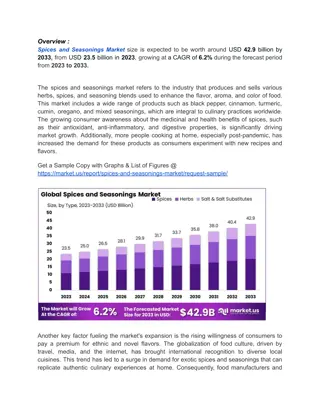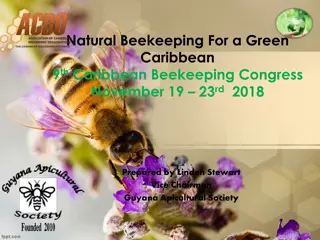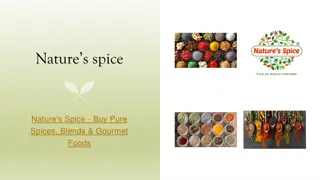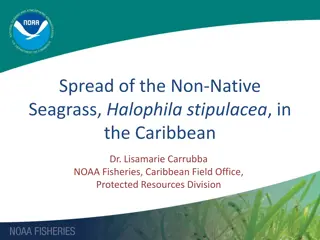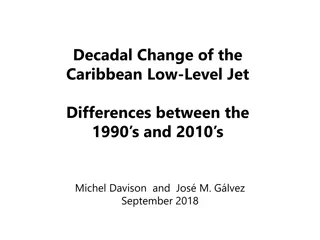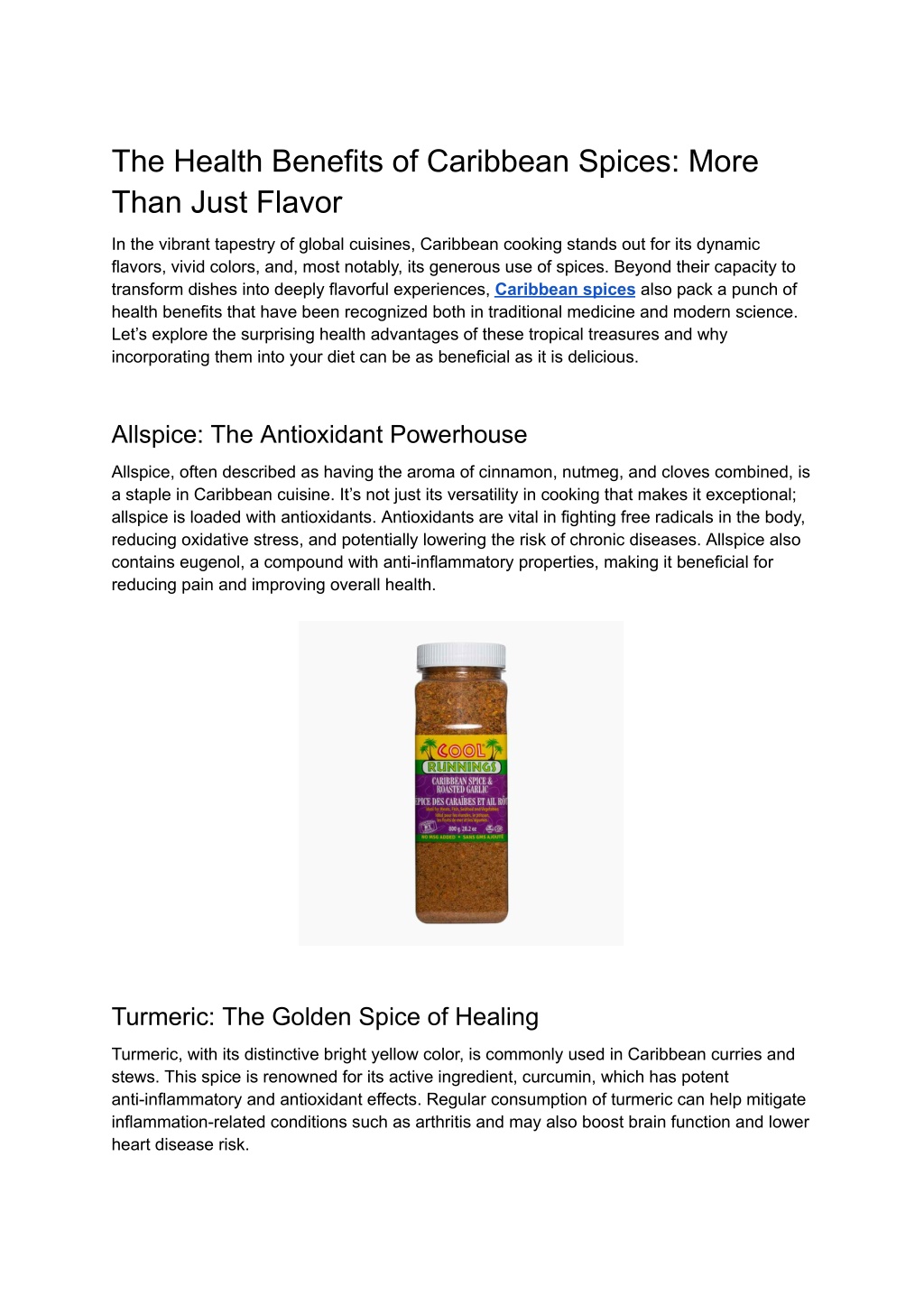
The Health Benefits of Caribbean Spices_ More Than Just Flavor
Caribbean spices offer a world of flavors and a bounty of health benefits. They remind us that eating for health doesnu2019t have to be bland.
Uploaded on | 1 Views
Download Presentation

Please find below an Image/Link to download the presentation.
The content on the website is provided AS IS for your information and personal use only. It may not be sold, licensed, or shared on other websites without obtaining consent from the author. Download presentation by click this link. If you encounter any issues during the download, it is possible that the publisher has removed the file from their server.
E N D
Presentation Transcript
The Health Benefits of Caribbean Spices: More Than Just Flavor In the vibrant tapestry of global cuisines, Caribbean cooking stands out for its dynamic flavors, vivid colors, and, most notably, its generous use of spices. Beyond their capacity to transform dishes into deeply flavorful experiences, Caribbean spices also pack a punch of health benefits that have been recognized both in traditional medicine and modern science. Let s explore the surprising health advantages of these tropical treasures and why incorporating them into your diet can be as beneficial as it is delicious. Allspice: The Antioxidant Powerhouse Allspice, often described as having the aroma of cinnamon, nutmeg, and cloves combined, is a staple in Caribbean cuisine. It s not just its versatility in cooking that makes it exceptional; allspice is loaded with antioxidants. Antioxidants are vital in fighting free radicals in the body, reducing oxidative stress, and potentially lowering the risk of chronic diseases. Allspice also contains eugenol, a compound with anti-inflammatory properties, making it beneficial for reducing pain and improving overall health. Turmeric: The Golden Spice of Healing Turmeric, with its distinctive bright yellow color, is commonly used in Caribbean curries and stews. This spice is renowned for its active ingredient, curcumin, which has potent anti-inflammatory and antioxidant effects. Regular consumption of turmeric can help mitigate inflammation-related conditions such as arthritis and may also boost brain function and lower heart disease risk.
Cinnamon: More Than Just a Sweet Spice Cinnamon is another beloved spice in the Caribbean pantry, treasured for its sweet, woody flavor and medicinal properties. It s known to have impressive effects on blood sugar levels, making it a valuable spice for people with diabetes. Cinnamon can improve insulin sensitivity and reduce blood sugar spikes after meals, contributing to overall diabetes management. Ginger: The Root of Wellness Ginger, a root with a sharp, peppery flavor, is frequently used in Caribbean cooking and herbal teas. Its health benefits are widely recognized, especially its ability to soothe digestive disturbances and reduce nausea. Ginger also boasts anti-inflammatory and antioxidant effects, contributing to a healthy immune system and possibly reducing muscle pain and soreness. Scotch Bonnet Peppers: Heat with a Heart While known for their fiery heat, Scotch bonnet peppers are also rich in vitamins A and C, crucial for immune health and skin integrity. The capsaicin in these peppers, responsible for their spiciness, has been linked to boosting metabolism and promoting fat loss. Additionally, capsaicin has pain-relieving properties, making these peppers beneficial beyond their culinary use. Incorporating Caribbean Spices into Your Diet Incorporating these spices into your diet is easier. Start with simple additions like sprinkling cinnamon on your oatmeal, adding turmeric to your smoothies, or including allspice in your next batch of homemade chili. Not only will these spices enhance the flavor of your meals, but they ll also boost your nutrient intake. Conclusion Caribbean spices offer a world of flavors and a bounty of health benefits. They remind us that eating for health doesn t have to be bland. By incorporating these spices into our daily meals, we can enjoy the rich tapestry of Caribbean flavors while nurturing our bodies. So, the next time you reach for that spice jar, remember that you re not just seasoning your food; you re also adding a dash of wellness to your life. FAQ Q: What are Caribbean spices?
A: Caribbean spices refer to a variety of herbs and seasonings commonly used in Caribbean cuisine. They include allspice, turmeric, cinnamon, ginger, and Scotch bonnet peppers, among others, known for their bold flavors and health benefits. Q: Can Caribbean spices improve my health? A: Yes, many Caribbean spices have been shown to offer health benefits. For example, turmeric contains curcumin, which has anti-inflammatory properties, and cinnamon can help regulate blood sugar levels. However, spices should complement a balanced diet and healthy lifestyle for optimal benefits. Q: Are there any risks to consuming Caribbean spices? A: For most people, consuming Caribbean spices in culinary amounts is safe and beneficial. However, individuals with certain health conditions, such as stomach ulcers or spice allergies, should use caution. High amounts of capsaicin from hot peppers may cause discomfort for some. Always consult with a healthcare provider if unsure. Q: How can I include more Caribbean spices in my diet? A: You can start by adding spices like cinnamon to your oatmeal or coffee, incorporating turmeric into soups and stews, or using allspice in your baking. Experimenting with small amounts in your cooking is a great way to discover what flavors you enjoy. Q: Do I need to use fresh spices, or are dried spices just as good? A: Both fresh and dried spices have their benefits. Fresh spices often have a more potent flavor and aroma, while dried spices have a longer shelf life and can be more convenient. The choice depends on personal preference and the specific dish you re preparing. Q: Can Caribbean spices help with weight loss? A: Some components of Caribbean spices, like the capsaicin in Scotch bonnet peppers, have been linked to a modest boost in metabolism and fat burning. However, spices alone are unlikely to lead to significant weight loss without other lifestyle changes. Q: Are Caribbean spices kid-friendly? A: Many Caribbean spices are kid-friendly, especially when used in small amounts to avoid overwhelming their palates. Be cautious with hot spices like Scotch bonnet peppers, and adjust the spice levels according to your child s tolerance. Q: Where can I find Caribbean spices? A: Caribbean spices can be found in the international aisle of many supermarkets, specialty food stores, and online retailers. For authentic flavors, look for brands that source their spices directly from the Caribbean. Q: Can I grow Caribbean spices at home? A: In the right climate or with indoor gardening techniques, it's possible to grow some Caribbean spices at home, such as ginger or herbs like cilantro. However, tropical spices like allspice and turmeric may require specific conditions to thrive. Q: How should I store my Caribbean spices?
A: Store your Caribbean spices in a cool, dark place in airtight containers. Dried spices can last for several months to a few years if stored properly, while fresh spices and herbs should be used more quickly or frozen for longer storage.










